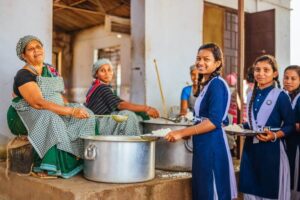TBB BUREAU
BHUBANESWAR, FEB 28, 2024
In a significant move towards environmental consciousness, the ST&SC Development, Minorities, and Backward Classes Welfare Department has unveiled an ambitious plan to revolutionize the culinary landscape of its residential schools and hostels by embracing eco-friendly kitchen setups. This paradigm shift will see the traditional cooking methods replaced with the utilization of Liquefied Petroleum Gas (LPG) across the entire state.
Roopa Roshan Sahoo, the Commissioner-cum-Secretary of the ST&SC Development, Minorities, and Backward Classes Welfare Department, took the helm of this transformative initiative, issuing a resolute directive to all Collectors on Wednesday. This directive underscores the imperative for schools, hostels, and affiliated institutions within the department’s purview to adopt this eco-friendly ethos and transition to LPG-based cooking environments.
 With a sprawling network of 1,736 schools under its stewardship, alongside approximately 6,000 hostels scattered statewide, including those under the esteemed Anwesha and Akankhya Programs catering to over 500,000 ST&SC students, this initiative holds the promise of fostering a greener and healthier milieu within hostel kitchens.
With a sprawling network of 1,736 schools under its stewardship, alongside approximately 6,000 hostels scattered statewide, including those under the esteemed Anwesha and Akankhya Programs catering to over 500,000 ST&SC students, this initiative holds the promise of fostering a greener and healthier milieu within hostel kitchens.
Sahoo emphasized the government’s unwavering commitment to augmenting residential facilities by not only bolstering infrastructure but also by broadening entitlements for boarder students. This includes provisions for winter clothing, casual attire, and dietary enhancements, all of which are pivotal components in fortifying overall living conditions.
The transition to LPG-based cooking facilities will be executed meticulously in phases, with a comprehensive rollout slated for completion by the end of the 2025-26 academic year. During the initial phase in 2024-25, a total of 422 High Schools, 62 Higher Secondary Schools, 5 Kalinga Model Residential Schools, 1 Biju Patnaik Adarsh Vidyalaya, and 93 Anwesha Hostels will be seamlessly integrated into the plan, encompassing 1,222 hostels accommodating 176,000 boarders. Subsequently, the remaining schools and hostels will undergo the transition in the subsequent academic year.
To facilitate the implementation of this visionary initiative, additional funds have been earmarked in the Annual Budget 2024-25. These funds will defray expenses associated with procuring cooking gas stoves, LPG cylinders, and requisite fuel charges. The meticulous selection of specific schools and hostels for the transition will be meticulously orchestrated at the district level and seamlessly communicated to the department.
During the inaugural phase of the 2024-25 academic year, a total of 50 High Schools, 20 Higher Secondary Schools, 5 Kalinga Model Residential Schools, 1 Biju Patnaik Adarsh Vidyalaya, and 25 Anwesha Hostels will embark on this transformative journey. The department is steadfast in its commitment to completing the first phase of the transition by June 30, 2024, encompassing all identified schools and hostels within the designated categories.
 The Business Bytes
The Business Bytes